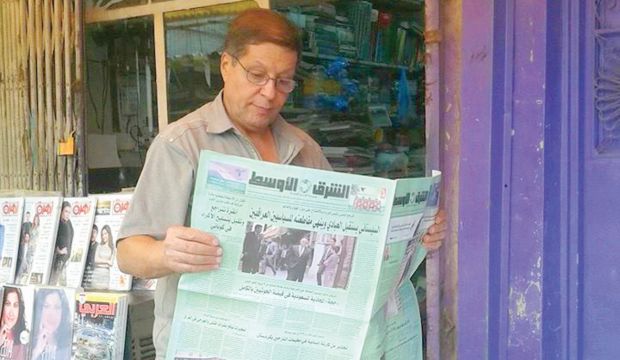
Customers pick up a copy of Asharq Al-Awsat at a Baghdad newsstand on October 21, 2014. (Asharq Al-Awsat)
Baghdad, Asharq Al-Awsat—Political and media figures welcomed the return of Asharq Al-Awsat newspaper to Iraq’s newsstands on Tuesday after a 10 month absence.
A Baghdad newsstand owner, Abu Zaina, said he was happy to see the return of the pan-Arab daily to Iraq; he erected a large sign alerting passers-by that the newspaper is once again being sold in the country. “Every day, many people would ask where their copy of Asharq Al-Awsat was, before the ban the newspaper would sell out within hours,” he said.
Forces linked to Baghdad Operations Command had banned the newspaper without any legal authorization as part of a broader media clampdown in the country carried out earlier this year.
The publishing house where Asharq Al-Awsat was printed in Iraq had been forcibly closed by government forces and its staff expelled from the building as part of a much-criticized media crackdown undertaken by the Nuri Al-Maliki administration.
Ahmed Abdul Hussein, editor-in-chief of Iraq’s Qurtas News, told Asharq Al-Awsat: “The policy of forcibly closing media institutions and gagging the media is one of the biggest mistakes made by the former government after it took the decision to form a committee to monitor the media.
“The main objective of this committee was to censure and forcibly close the media outlets that were criticizing government policy and influencing public opinion, including our own media outlet.
“We hope that this policy changes after it has been shown to fail. Media is like a raging river; it cannot be obstructed or diverted by written decisions. Proof of this is the increase in the number of people who visited alternative websites after the government took the decision to block social media websites and YouTube during the early days of the Mosul crisis,” he added.
Hussein criticized the weak laws protecting media freedoms in Iraq, adding that this had opened the door for the Maliki government to censor privately-owned media in Iraq.
Director of Iraq’s Journalistic Freedoms Observatory Ziad Al-Ajili, agreed that media freedoms had witnessed “broad violations” during the Maliki era, pointing to the policy of “indiscriminate harassment” against journalists carried out during the period.
He told Asharq Al-Awsat: “As an observatory committed to monitoring media freedoms, we issued a statement condemning the shutdown of Asharq Al-Awsat newspaper. The problem is that the former government did not believe in media pluralism and was seeking to promote a single media vision.”
Ajili said that media outlets that circulated views that were opposed by government were subject to censorship, harassment or forcibly shut down.
The observatory’s director added that he hopes that the new government, led by consensus figure Haider Al-Abadi, will pursue a more tolerant, professional and enlightened approach in its dealings with the media.
Iraqi MP Farhad Hassan said that parliament is discussing a new media law that will strengthen press freedoms in the country, including the prevention of the arbitrary closure of media outlets and ensuring freedom of expression. He described the former government’s closure of Asharq Al-Awsat as illegal, but added that there had been no legal mechanism in place to reverse the closure.
Another Iraqi lawmaker, Maysoon Al-Damluji of the Iraqiya coalition and a member of parliament’s Culture and Information Committee, strongly criticized the Maliki government’s media crackdown, but added that media clampdowns such as this are impossible to maintain in the digital age. “The internet today is available to everybody and the decision to stop the publication of the print edition of Asharq Al-Awsat [in Iraq] only increased the number of Iraqis who read it on the Internet,” she said.
“Asharq Al-Awsat is known for its neutrality and role in combatting extremism and is read across the region. The decision to prevent its publication [in Iraq] came out of a desire of the decision-makers at the time to silence all voices of criticism,” she added.

Trackbacks/Pingbacks